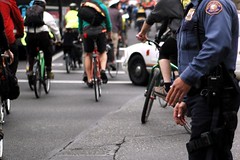
at the bike box press event in March.
(Photos © J. Maus)
Portland Police Bureau Traffic Division Captain Larry O’Dea wants to learn more about bicycle laws.
In fact, he also wants his officers, local judges, bike advocates, lawyers, and others to learn more too.
Next month, he’ll assemble all of them to discuss their perspectives and expectations about how bike laws are enforced.
I heard Captain O’Dea mention this at a meeting of the Portland Bicycle Advisory Committee (PBAC) on Tuesday night and he told me more in a conversation we had afterwards.
O’Dea says since taking his position in January, he has heard that many people have different ideas, expectations, and interpretations of how bike laws should be enforced.
The meeting is his effort to “get everyone on the same page,” and he says the first meeting will focus specifically on laws around the right-hook situation (where a motor vehicle turns right as a bicycle operator is going straight) — an especially hot topic right now with the roll-out of Portland’s new bike boxes.
One of the methods O’Dea plans to employ at the meeting is to pose a series of hypothetical situations. He’ll present a specific situation that leads to a bike/car collision and then he’ll ask everyone around the table how they would respond: Would they ticket the bicycle operator? The motor vehicle operator? Both? Neither?
It’s an interesting exercise, and one that was tried out by Officer Robert Pickett at the recent PBAC meeting as part of his own personal research. Pickett (now a PBAC member) asked us all to vote on the hypotheticals (the results sparked a bit of heated debate) and he’s using the data to gain a better understanding of how to enforce the laws.
O’Dea says this is just the first of what he hopes is a regular committee that can improve enforcement and interpretation of bike laws. In the future, O’Dea thinks the group might even end up proposing new bike-related legislation. “If we get to discussing a law, and we realize it just doesn’t work properly, maybe we’ll be able to approach the legislature with a possible fix.”
This is yet another step in a positive direction for the Traffic Division.
O’Dea and his Lieutenant Bryan Parman have so far made good on their promise to stay actively involved with the community on bike issues. They have been a welcome improvement over previous Traffic Division leadership, whose communication and enforcement styles put a strain on community relationships and reached a boiling point after two tragic fatalities last October.


